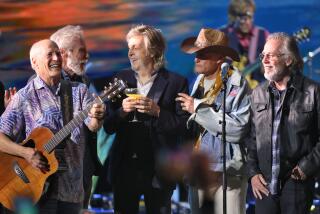Someone Wuz Robbed, But He’ll Never Know Who
- Share via
I am dismayed to learn that I have been relying on an outdated edition of Bartlett’s Familiar Quotations for my access to pertinent sayings, such as “England expects every man will do his duty” (Horatio Nelson before the Battle of Trafalgar).
In the case of Lord Nelson, the obsolescence of my Bartlett’s might not seem to matter, since that famous remark rests safely in history, beyond revision. However, it is noted that Nelson’s own version was “England confides that every man will do his duty,” and his flag lieutenant, Capt. Pasco, suggested substituting expects for confides. Further, Capt. Blackwood, commander of the Euryalus, said that the correction was from Nelson expects to England expects.
I am not surprised, therefore, to learn that the immortal remark of fight manager Joe Jacobs--”We wuz robbed!”--has been altered between Bartlett’s 13th and 14th editions to “We was robbed!”
However, I have already conceded that the use of wuz is an unfair imputation of illiteracy, since we all pronounce was as wuz . Also, in reporting this change, Stephen H. Statham notes that Bartlett’s stays with its earlier reporting of Jacobs’ other immortal remark as “I should of stood in bed.”
Like several other readers, Statham thinks what Jacobs said was “We shoulda stood in bed.” I do not agree, and I applaud Bartlett’s for declining to make this concession to revisionists.
Leo Katcher of Oceanside insists it was Hymie Jacobs, a figure of the fight scene and Broadway night life, who said “I shoulda stood in bed.” Hymie never went anyplace west of Hoboken, Katcher says, but he was talked into attending a World Series game in a drizzle, and that weather provoked the famous remark.
But Don McVicar of Hermosa Beach sends an article by Shirley Povich, sports editor emeritus of the Washington Post, in which he recalls that the game was played in 1934 on a “cold, blustery day in Detroit,” and both he and sportswriter Paul Gallico heard Joe Jacobs, “a Damon Runyan character,” mutter, “I shoulda stood in bed.”
Granted that Povich and Gallico were there, they might easily have mistaken should of for shoulda.
Meanwhile, as I foresaw, several readers have written to identify the Joe Gould whom Jim Murray quoted as saying “I should of stood in bed.” Ralph S. Braudy and others write that Joe Gould was Jim Braddock’s manager, but they do not attribute that quote to him.
Several readers, on the other hand, identify Joe Gould as an eccentric Harvard graduate known as “Professor Seagull” who hung around Greenwich Village in the ‘30s and ‘40s, cadging drinks in bars, surviving on ketchup sandwiches, and compiling, in hundreds of cheap notebooks, an “Oral History of the World.”
Jason Wingreen says Gould was known as “Professor Seagull” because of “a resemblance to that bird.” As for his “Oral History of the World,” for which he took down millions of words, “not a trace remains.”
Stan Margulies writes that Gould used to feed the birds in Washington Square, and “he himself resembled a bird, given to great swooping movements and occasional shrill shrieks.”
But this Gould, according to Jerome Foster of Los Osos, would never have said, “I should of stood in bed.” “He never would have committed such a solecism.”
Foster also sends an obituary reporting Gould’s death at 68. Fifty friends attended his funeral. His unpublished manuscript was believed to be 11 times longer than the Bible. Gould once called himself “the foremost authority in the U.S. on doing without,” and added that he lived on “air, self-esteem, cigaret butts, cowboy coffee (black, no sugar) fried egg sandwiches and ketchup.”
The obituary noted that “restaurant men throughout the Village hid the ketchup the moment Joe stuck a foot in the door.” Gould once said, “I’m out of joint with the rest of humanity because I don’t want to own anything.” He was plagued by what he called the three H’s--homelessness, hunger and hangovers.
Meanwhile, Volney F. Morin clarifies another point of grammar. In 1942, when he was a Navy recruit, two petty officers walked up to a group of recruits in which he stood and one said, “Youse guys come with me. The rest of yez go with him.”
“It was the first time I had heard the plural of youse,” Morin notes.
Actually, I think it’s yuz not yez .
More to Read
Go beyond the scoreboard
Get the latest on L.A.'s teams in the daily Sports Report newsletter.
You may occasionally receive promotional content from the Los Angeles Times.










